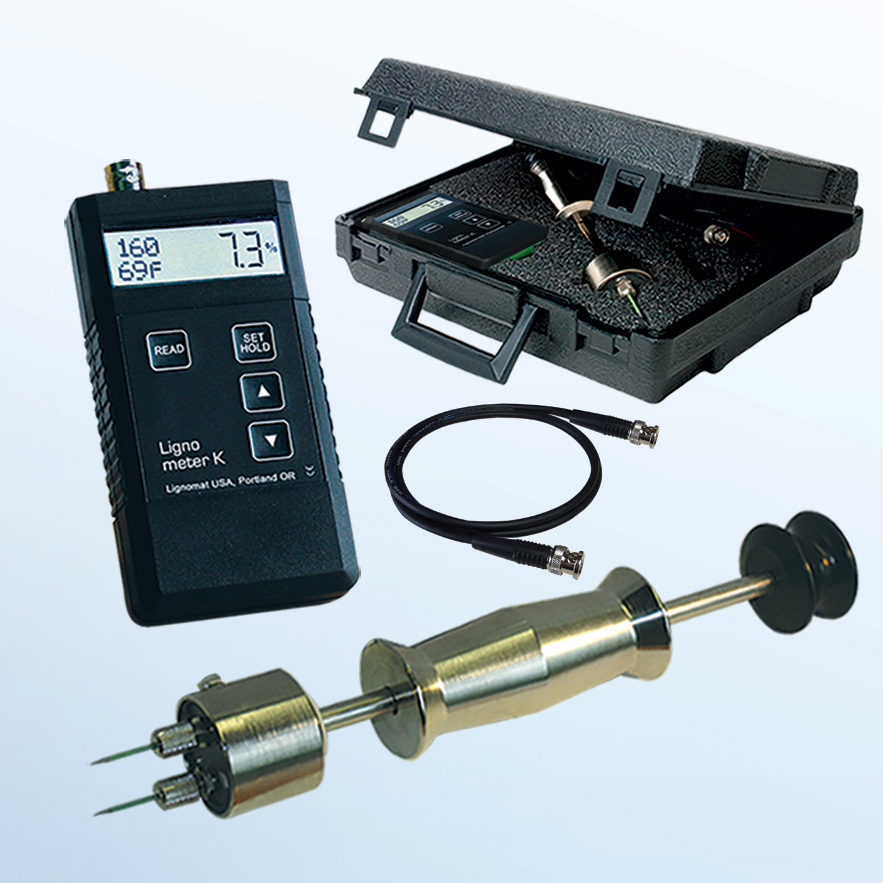The Ultimate Overview to Picking the Right Moisture Meter for Your Demands
The Ultimate Overview to Picking the Right Moisture Meter for Your Demands
Blog Article
The Ultimate Guide to Dampness Meters: A Comprehensive Introduction and Exactly How They Can Save You Cash
Wetness meters serve as crucial tools in finding and keeping track of moisture web content in products, aiding in preventing costly problems and making sure the high quality of items. Comprehending the nuances of different types of moisture meters, their applications, and the potential cost-saving benefits they use can be a game-changer for experts and companies alike.
Kinds Of Dampness Meters
One typical kind is the pin-type moisture meter, which determines the electric resistance between two pins inserted right into a product. Pinless dampness meters, on the various other hand, use electro-magnetic sensing unit plates to scan a larger location without creating damage to the material's surface area.

Infrared wetness meters determine the thermal properties of a material to establish its wetness content non-invasively, making them useful for applications where pin or pinless meters may not be appropriate. Understanding the various kinds of dampness meters offered can help sectors choose the most proper tool for their particular dampness dimension needs.

Advantages of Using Wetness Meters
Moisture meters use invaluable benefits in precisely examining and keeping track of dampness degrees in varied products and environments. One of the primary benefits of using wetness meters is the prevention of possible damages created by excess moisture.
In addition, utilizing dampness meters can lead to increased energy effectiveness. By recognizing areas with high wetness degrees, such as leaks or bad insulation, changes can be made to boost energy conservation and lower utility prices. In farming setups, moisture meters play an essential function in maximizing plant returns by allowing farmers to keep an eye on soil moisture degrees and make educated watering choices. Generally, the benefits of utilizing moisture meters cover throughout various sectors, offering cost-efficient services and advertising better quality assurance practices.
Just How to Choose the Right Wetness Meter
Selecting the suitable dampness meter involves thinking about vital factors such as material compatibility, dimension array, and calibration accuracy. When selecting a dampness meter, it's important to guarantee that the meter is appropriate for the details product you will be testing. Different products have differing electrical residential properties that can influence moisture readings, so selecting a meter created for your product is crucial for accurate outcomes. Additionally, think about the dimension series of the moisture meter. Guarantee that the meter can spot dampness degrees within the range needed for your applications. Calibration precision is one more critical variable to bear in mind. Choose a dampness meter with reputable calibration to make sure constant and exact analyses. Some meters might need regular calibration modifications, so comprehending the calibration process is very important. By thoroughly assessing these elements, you can choose a moisture meter that fulfills your requirements and provides accurate moisture dimensions for your jobs.
Correct Methods for Dampness Meter Usage

Cost Savings Through Dampness Meter Applications
Just how can the calculated utilization of dampness meters lead to considerable price savings throughout different sectors? In the farming industry, wetness meters aid in establishing the ideal time for harvesting plants, stopping over-drying or excess dampness that you could try here can affect the last product's top quality.
Likewise, in construction, wetness meters aid avoid pricey damages by discovering moisture degrees in building materials, such as timber or concrete, which can cause architectural concerns if not dealt with promptly. By recognizing issue locations early, professionals can take rehabilitative actions to prevent comprehensive repairs or replacements, inevitably saving time and cash.
Additionally, in the food handling sector, moisture meters are necessary for keeping track of item quality and making sure compliance with security policies. By properly measuring moisture material in foodstuff, suppliers can prevent spoilage, maintain freshness, and decrease waste, leading to considerable expense savings. In general, the calculated application of wetness meters is a useful financial investment that can cause considerable expense decreases and enhanced efficiency across various industries.
Verdict
In conclusion, dampness meters are beneficial devices for identifying and gauging wetness degrees in different materials. By utilizing the appropriate dampness meter and complying with appropriate methods, users can effectively protect against pricey problems triggered by excess moisture. Purchasing a high quality wetness meter can lead to substantial expense savings over time by recognizing possible problems early on and making it possible for punctual remediation. Inevitably, wetness meters are necessary tools for maintaining the honesty and durability of products and frameworks.
Dampness meters serve as important tools in identifying and keeping an eye on moisture material in products, helping in avoiding pricey damages and ensuring the high quality of items. Infrared wetness meters measure the thermal more tips here homes of a product to determine its dampness content non-invasively, making them useful for applications where pin or pinless meters might not be suitable.Dampness meters use very useful benefits in properly examining and checking wetness levels in diverse materials and environments. In farming settings, moisture meters play a crucial role in maximizing plant yields by allowing farmers to keep an eye on soil moisture degrees and make Web Site informed watering choices.In final thought, dampness meters are useful devices for detecting and gauging dampness degrees in different materials.
Report this page